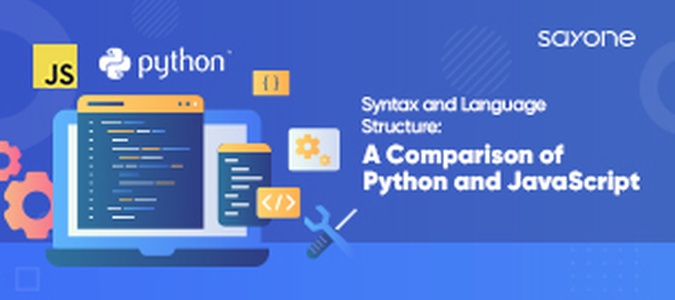Python Vs Javascript: What are the Differences? in 2023
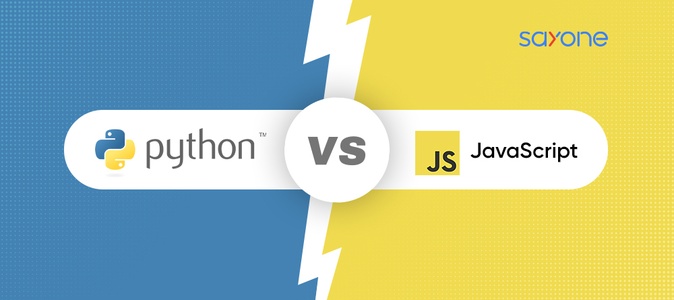
Share This Article
Syntax and Language Structure: A Comparison of Python and JavaScript
Table of Contents
Subscribe to Our Blog
We're committed to your privacy. SayOne uses the information you provide to us to contact you about our relevant content, products, and services. check out our privacy policy.
Python and JavaScript are two of the most popular programming languages today. While they share some similarities, they also have significant differences in syntax, usage, data types, performance, etc. In this article, we will explore the differences between Python and JavaScript, their respective pros and cons, and use cases, providing you with the information you need to decide which language to use in your next project.
What is Python?
Python is a general-purpose, high-level programming language first released in 1991. It's known for its simplicity and readability, making it an ideal language for beginners. Python supports multiple programming paradigms, including object-oriented, functional, and procedural. Its syntax is easy to read and write, focusing on code readability. Python is widely used in scientific computing, data analysis, web development, artificial intelligence, and machine learning.
What Is JavaScript?
JavaScript is a programming language that was created for the web. It is versatile and flexible, allowing developers to create dynamic and interactive web pages, mobile and server-side applications. JavaScript is often used with HTML and CSS to create rich multimedia experiences. It has many libraries and frameworks, making it popular for front-end and back-end development.
Read our Blog :"Top 10 Python Frameworks for Web Development in 2023"
Syntax and Usage
Python and JavaScript have different syntax and usage patterns. Python is known for its readability, while JavaScript is known for its flexibility. Here are some of the key differences:
Variables
You don't need to declare a variable's data type in Python before assigning a value. Python automatically infers the data type based on the value assigned.
For example:

In JavaScript, you need to declare the data type of a variable before assigning a value to it.
For example:

Functions
In Python, functions are defined using the def keyword.
For example:

In JavaScript, functions are defined using the function keyword.
For example:

Conditional Statements
In Python, conditional statements are defined using `if`, `elif`, and `else` keywords.
For example:
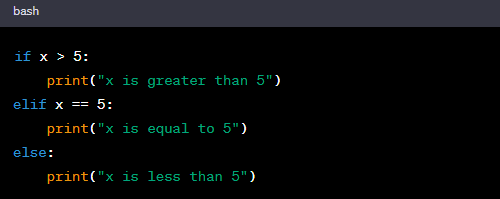
In JavaScript, conditional statements are defined using `if`, `else if`, and `else` keywords.
For example:
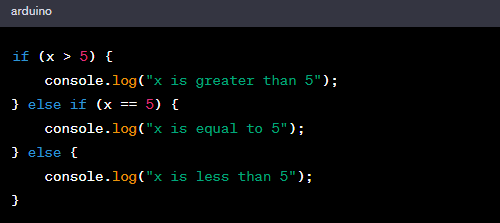
Python's syntax is generally more concise and easier to read, while JavaScript's syntax is more flexible and allows for more complex programming constructs.
Here is a simple code example that shows the differences in syntax and usage between Python and JavaScript:
Python Code
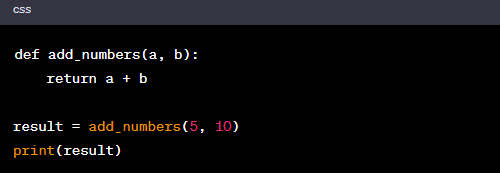
JavaScript Code
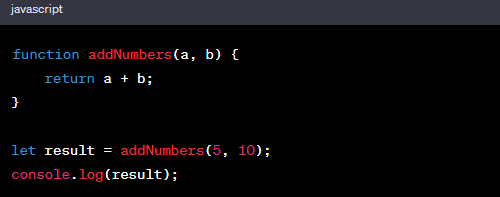
In this example, the Python code defines a function using the `def` keyword, while the JavaScript code defines a function using the `function` keyword. The Python code uses `print()` to output the result, while the JavaScript code uses `console.log()`.
Read our Blog :"9 Popular JavaScript (JS) Frameworks to use in 2023"
Data Types and Structures
Python and JavaScript have some differences in their approach to data types and structures.
Numeric Data Types
Python supports complex numbers as a built-in data type, while JavaScript does not. Additionally, Python has built-in support for arbitrary-precision integers, while JavaScript does not.
None vs null
In Python, `None` is a unique value representing the absence of a value, while in JavaScript, `null` represents the absence of a value. Although both are used to represent the absence of a value, they differ in how they are treated in the two languages. For example, in Python:
Python

In this case, the `if` statement will be true because `x` is `None`. In JavaScript, you can use the `null` keyword to represent the absence of a value:
Javascript

In this case, the `if` statement will also be true because `x` is `null`.
Primitive Data Types
Both Python and JavaScript have primitive data types that are passed by value, such as numbers, strings, and booleans. These primitive data types are immutable, meaning their values cannot be changed once created. Additionally, both languages have objects passed by reference and can have properties and methods.
Understanding these data types and structure differences is essential for writing correct and efficient code in each language. Choosing the suitable data types and structures for the task makes your code more readable, maintainable, and performant.
Looking to port to microservices? Give us a call today!
Libraries and Frameworks
Libraries and frameworks are essential to modern software development, providing developers with pre-built tools and functionality to solve everyday problems. Python and JavaScript have a rich ecosystem of libraries and frameworks, with many popular options for web development, machine learning, and data science.
Python Libraries and Frameworks
Some popular libraries and frameworks in Python include Django, Flask, NumPy, and Pandas. Django is a web framework that provides a high-level view of web development, while Flask is a micro web framework that is more lightweight and flexible. NumPy and Pandas are libraries that provide powerful tools for scientific computing and data analysis.
Javascript Libraries and Frameworks
In JavaScript, some popular libraries and frameworks include React, Vue.js, Express.js, and Node.js. React is a front-end library for building user interfaces, while Vue.js is a progressive framework that can be used for building complex single-page applications. Express.js and Node.js are both back-end frameworks that can be used for building scalable and high-performance web applications.
By using these libraries and frameworks, developers can save time and effort by reusing existing code and leveraging the knowledge and expertise of the community.
Pros and Cons of Each Language
Python and JavaScript are popular programming languages with their own unique advantages and disadvantages.
Pros of Python
- Simpler syntax than JavaScript, making it easier to learn and use.
- Python is widely used in scientific computing, data analysis, and machine learning, with many libraries and frameworks available.
- Built-in support for multi-threading and asynchronous programming, making it well-suited for concurrent programming tasks.
- Large and active community.
Read our blog : “10 Best Frameworks for Android App Development in 2023”.
Cons of Python
- Slower than other languages for specific tasks, especially those that require high performance.
- Python's dynamic typing can lead to unexpected errors if not properly handled.
- The whitespace-based syntax can make it difficult to read and debug code.
Pros of JavaScript
- Supported by all major web browsers, making it a powerful tool for web development.
- Fast and efficient, with many libraries and frameworks available for high-performance tasks.
- JavaScript has a flexible and dynamic type system, allowing quick and easy prototyping.
- JavaScript has a large and active community.
Cons of JavaScript
- JavaScript can be difficult to learn and use due to its complex syntax and idiosyncrasies.
- JavaScript's asynchronous programming model can lead to confusing and hard-to-debug code.
- JavaScript's type of coercion can lead to unexpected results if not properly understood and handled.
Read our blog : "Python vs. C#: Which One to Choose for Your Project"
Use Cases and Recommendations
Python and JavaScript have different strengths and weaknesses, which make them more suitable for specific use cases than others. Here are some everyday use cases and recommendations for each language:
Python Use Cases
Data analysis: Python's powerful libraries for data analysis, such as NumPy, Pandas, and Matplotlib, make it a popular choice for data scientists and analysts.
Web development: Python's ease of use and flexibility make it a good choice for web development, especially for building scalable and maintainable back-end services with frameworks like Django or Flask.
Machine learning: Python's extensive support for machine learning libraries, such as TensorFlow, PyTorch, and Scikit-learn, makes it a popular choice for developing machine learning models and applications.
Automation and scripting: Python's simplicity and readability make it an excellent choice for automating repetitive tasks or writing scripts to perform batch operations.
JavaScript Use Cases
Front-end web development: JavaScript is the only language that can be executed in a web browser, making it essential for front-end web development. Popular front-end frameworks like React, Angular, and Vue are built using JavaScript.
Back-end web development: JavaScript can also be used for back-end web development with Node.js, a runtime environment that allows developers to write server-side applications using JavaScript.
Interactive web applications: JavaScript's ability to dynamically manipulate the DOM makes it a good choice for building interactive web applications and games.
Mobile app development: JavaScript can be used with frameworks like React Native or Ionic to develop cross-platform mobile applications.
Conclusion
In conclusion, Python and JavaScript are popular programming languages with different strengths and use cases. Python excels in data analysis and machine learning, while JavaScript is essential for front-end web development and interactive web applications. Ultimately, the choice between the two depends on the specific needs of your project.
Looking for web or mobile app development services? Get in touch with us!
Contact us for expert assistance if you're looking to hire top-notch Python or JavaScript developers for your web or mobile app development services.
Share This Article
Subscribe to Our Blog
We're committed to your privacy. SayOne uses the information you provide to us to contact you about our relevant content, products, and services. check out our privacy policy.
